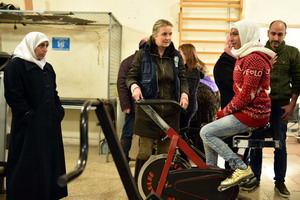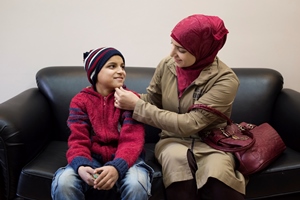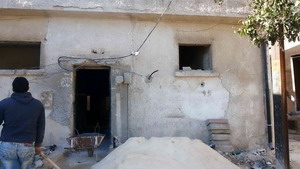Nationwide polio vaccination campaign aims to vaccinate more than 2.4 million children
 12 March 2018 – The World Health Organization (WHO) and UNICEF are supporting a nationwide polio vaccination campaign in the Syrian Arab Republic that aims to vaccinate more than 2.4 million children under 5 years of age in 13 governorates. The campaign, which is being managed by the Ministry of Health, was launched on 11 March and will last for 5 days.
12 March 2018 – The World Health Organization (WHO) and UNICEF are supporting a nationwide polio vaccination campaign in the Syrian Arab Republic that aims to vaccinate more than 2.4 million children under 5 years of age in 13 governorates. The campaign, which is being managed by the Ministry of Health, was launched on 11 March and will last for 5 days.
Helping Fatima get back on her feet
 Fatima walks to school for the first time in months. With support from the Government of Japan WHO was able to provide her physical treatment needed to overcome Guillain-Barré syndrome. WHO Syria 20188 March 2018 – Twelve-year-old Fatima Hamidi lives with her 5 sisters and 7 brothers in the city of Aleppo. Over the past few years, her family’s life has been upended by uncertainty and fear. The conflict finally abated last year, and life began returning to normal. But just as Fatima was finishing the school year and getting ready for the summer holiday, her arms and legs became weak. She found it difficult to play with her friends. Eventually, she was unable to move.
Fatima walks to school for the first time in months. With support from the Government of Japan WHO was able to provide her physical treatment needed to overcome Guillain-Barré syndrome. WHO Syria 20188 March 2018 – Twelve-year-old Fatima Hamidi lives with her 5 sisters and 7 brothers in the city of Aleppo. Over the past few years, her family’s life has been upended by uncertainty and fear. The conflict finally abated last year, and life began returning to normal. But just as Fatima was finishing the school year and getting ready for the summer holiday, her arms and legs became weak. She found it difficult to play with her friends. Eventually, she was unable to move.
After weeks of tests, doctors diagnosed her condition as Guillain-Barré syndrome, a rare but serious autoimmune disorder. The high cost of medicines and treatment quickly depleted the family’s finances, and they had to be stopped. When this happened, Fatima’s health rapidly deteriorated, and with it, her sense of hope.
 Fatima at a physical therapy session. WHO Syria 2018Desperate to help her daughter, Fatima’s mother found a patient recovering from the same syndrome, who told her about Yadan Biyad, a nongovernmental organization supported by the World Health Organization (WHO) that treats patients for free. Doctors and physical therapists at Yadan Biyad prescribed medicines and a rigorous course of daily physiotherapy for Fatima. Within weeks, she recovered enough strength to go for treatment on her own. It wasn’t long before she was back in school, studying hard and looking forward to the future again.
Fatima at a physical therapy session. WHO Syria 2018Desperate to help her daughter, Fatima’s mother found a patient recovering from the same syndrome, who told her about Yadan Biyad, a nongovernmental organization supported by the World Health Organization (WHO) that treats patients for free. Doctors and physical therapists at Yadan Biyad prescribed medicines and a rigorous course of daily physiotherapy for Fatima. Within weeks, she recovered enough strength to go for treatment on her own. It wasn’t long before she was back in school, studying hard and looking forward to the future again.
Fatima is one of over 13 000 Syrian children who have received free health care thanks to a generous donation to WHO from the Government of Japan. WHO has used these funds to support health-focused nongovernmental organizations that treat people throughout Syria. With support from Japan, nongovernmental organizations such as Yadan Biyad, Al-Ber, and Al-Ihsan Charity Society have treated over 67 000 Syrians who would otherwise have been unable to obtain any kind of health care.
Related link
Restoring hearing helps a child recover in Syria
 Nour and his mother sit together at the Tamayoz Social Care Association in Damascus1 March 2018 – Nour and his family fled their home in a besieged area last year, arriving in Damascus with almost nothing, after living through a terrifying ordeal. Nour lost his father and had stopped speaking.
Nour and his mother sit together at the Tamayoz Social Care Association in Damascus1 March 2018 – Nour and his family fled their home in a besieged area last year, arriving in Damascus with almost nothing, after living through a terrifying ordeal. Nour lost his father and had stopped speaking.
Now 11, Nour lost his hearing when he was an infant, but his family were unable to get him assistance until recently. Last year he received a hearing aid from the Tamayoz Social Care Association, a nongovernmental organization supported in part by the World Health Organization (WHO).
"Now he can talk, express his feelings, and call to me," says his mother. "It's made a big difference."
WHO health assessment to Al-Mouaddamiyeh in Rural Damascus
 Primary health care centre at Al-Mouaddamiyeh being rehabilitated with WHO support. WHO Syria 201828 February 2018 – WHO has participated in an inter-agency mission to assess health needs in Al-Mouaddamiyeh (Rural Damascus). This area, which recently became accessible following years of siege, is home to over a hundred thousand people. According to the local mayor, the numbers are likely to increase given the new-found stability in the city.
Primary health care centre at Al-Mouaddamiyeh being rehabilitated with WHO support. WHO Syria 201828 February 2018 – WHO has participated in an inter-agency mission to assess health needs in Al-Mouaddamiyeh (Rural Damascus). This area, which recently became accessible following years of siege, is home to over a hundred thousand people. According to the local mayor, the numbers are likely to increase given the new-found stability in the city.
The assessment team, which included representatives of the Syrian Arab Red Crescent, found that years of conflict had taken a toll on the city. Its main primary health care (PHC) centre had been damaged and its water supply network was no longer functioning, leaving people dependent on water tankers. The team also found that thousands of children under 5 years of age had not been vaccinated and that around 6000 students from 7 to 18 years of age had no access to PHC or mental health services in schools.


